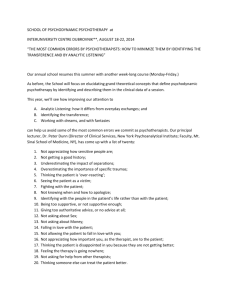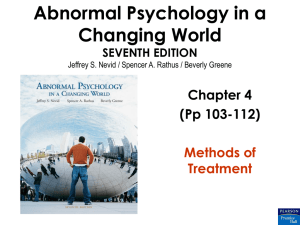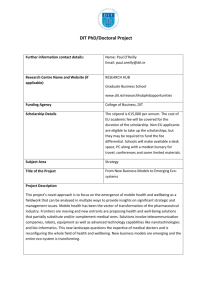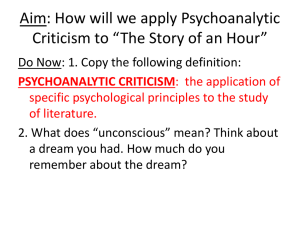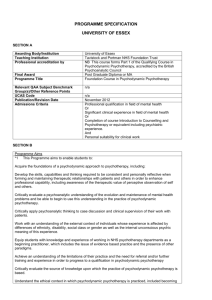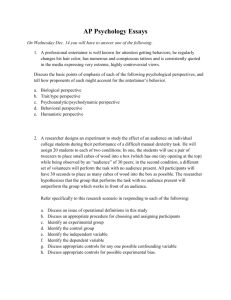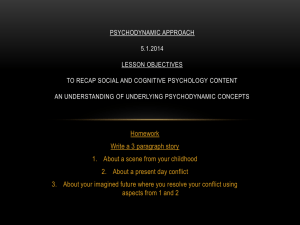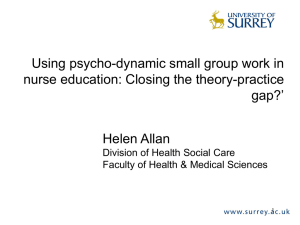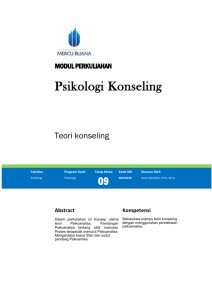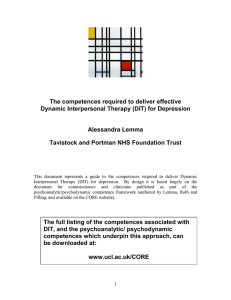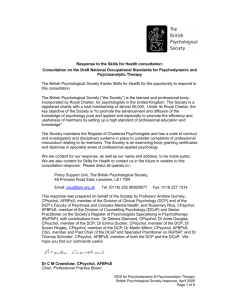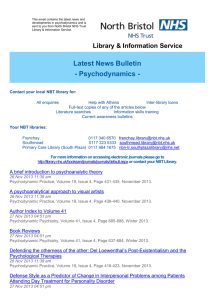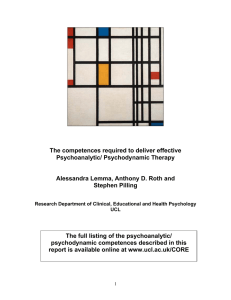DIT Training Leeds Form - Northern School of Child and
advertisement
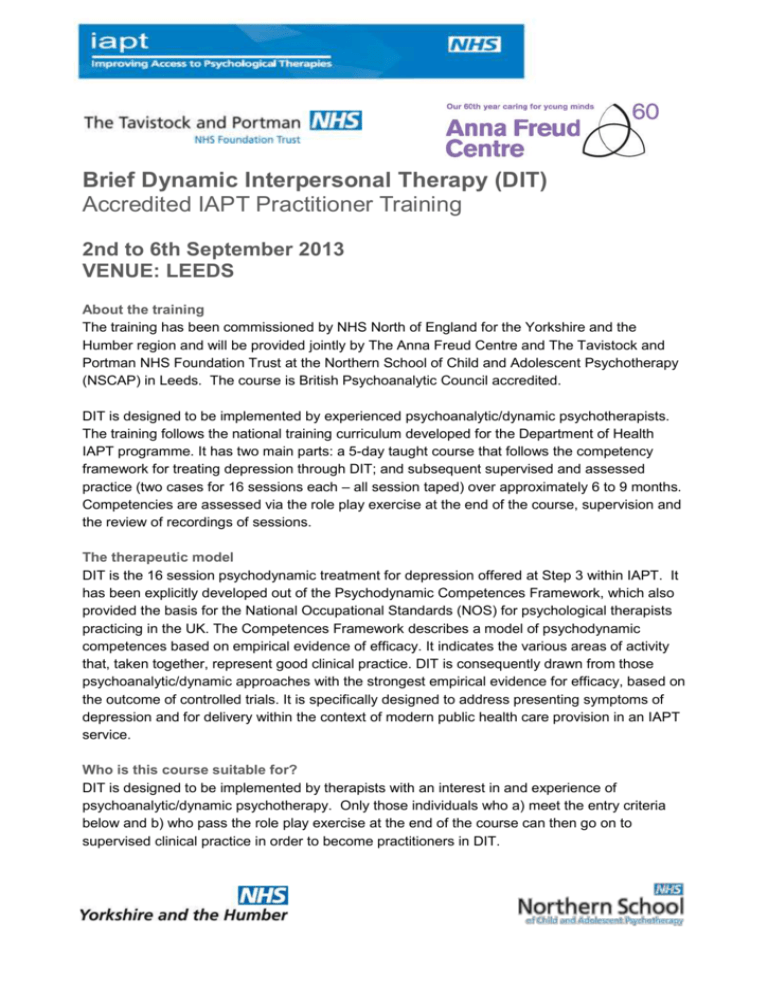
Brief Dynamic Interpersonal Therapy (DIT) Accredited IAPT Practitioner Training 2nd to 6th September 2013 VENUE: LEEDS About the training The training has been commissioned by NHS North of England for the Yorkshire and the Humber region and will be provided jointly by The Anna Freud Centre and The Tavistock and Portman NHS Foundation Trust at the Northern School of Child and Adolescent Psychotherapy (NSCAP) in Leeds. The course is British Psychoanalytic Council accredited. DIT is designed to be implemented by experienced psychoanalytic/dynamic psychotherapists. The training follows the national training curriculum developed for the Department of Health IAPT programme. It has two main parts: a 5-day taught course that follows the competency framework for treating depression through DIT; and subsequent supervised and assessed practice (two cases for 16 sessions each – all session taped) over approximately 6 to 9 months. Competencies are assessed via the role play exercise at the end of the course, supervision and the review of recordings of sessions. The therapeutic model DIT is the 16 session psychodynamic treatment for depression offered at Step 3 within IAPT. It has been explicitly developed out of the Psychodynamic Competences Framework, which also provided the basis for the National Occupational Standards (NOS) for psychological therapists practicing in the UK. The Competences Framework describes a model of psychodynamic competences based on empirical evidence of efficacy. It indicates the various areas of activity that, taken together, represent good clinical practice. DIT is consequently drawn from those psychoanalytic/dynamic approaches with the strongest empirical evidence for efficacy, based on the outcome of controlled trials. It is specifically designed to address presenting symptoms of depression and for delivery within the context of modern public health care provision in an IAPT service. Who is this course suitable for? DIT is designed to be implemented by therapists with an interest in and experience of psychoanalytic/dynamic psychotherapy. Only those individuals who a) meet the entry criteria below and b) who pass the role play exercise at the end of the course can then go on to supervised clinical practice in order to become practitioners in DIT. The pre-entry requirements in detail: Evidence of a course of study (this could be through different courses over time) that has exposed you to the fundamentals of psychoanalytic theory as specified in the Psychodynamic Competences framework (www.ucl.ac.uk/CORE and below) A minimum of 150hrs of supervised psychodynamic work (reference required) At least one year of weekly personal psychodynamic psychotherapy/counselling At least two years’ employment in an NHS or voluntary institution working in a therapeutic capacity with patients with mental health problems HPC, BPC, UKCP or BACP registration We also require a letter from your employer/manager confirming their support for you to undertake the necessary supervised and assessed practice (two cases for 16 sessions each – all session taped) over approximately 6 to 9 months following the initial 5 day course. Applying for the course To book a place on this course please complete the form below and send to NSCAP along with the required evidence of eligibility, CV and a letter of support from your current employer/manager. Contact person for queries: Ellie Pekala Course Administrator NSCAP Bevan House, 34-36 Springwell Road Leeds LS12 1AW Tel: 0113 3058750 Email: ellie.pekala@nhs.net For queries related to IAPT service development and funding please contact: Debi Hemingway IAPT Project Manager Yorkshire and the Humber SHA Tel: 0113 295 2000 Debi.Hemingway@yorksandhumber.nhs.uk Brief Dynamic Interpersonal Therapy (DIT) Application Form: September 2013, Leeds To book a place on this course you will need to evidence the following pre-entry requirements, along with your CV and a letter of support from your current employer/manager. Applicant Details (please type or write clearly) Name: Address: Telephone no. Mobile no: Email: Role: Base address: Employing organisation: Please tick the box to indicate you can meet each requirement, and provide either a certificate or reference from your training institution, supervisor or therapist as proof. Without this information it will not be possible to process your application. 1. A course of study (this could be through different courses over time) that has exposed you to the fundamentals of psychoanalytic theory as specified in the Psychodynamic Competences Framework (www.ucl.ac.uk/CORE and below) 2. A minimum of 150hrs of supervised psychodynamic work (reference required) 3. At least one year of weekly personal psychodynamic psychotherapy/counselling 4. At least two years’ employment in an NHS or voluntary institution working in a therapeutic capacity with patients with mental health problems 5. HPC, BPC, UKCP or BACP registration 6. Support from your employer/manager to undertake the necessary supervised and assessed practice (two cases for 16 sessions each – all session taped) over approximately 6 to 9 months following the initial 5 day course (supporting letter required). Applicant: Sign …………………………………. Date …………………… Please return application & supporting statements by 31st May 2013 To: ellie.pekala@nhs.net Psychodynamic Competences Framework These are the areas of competence relating to knowledge of psychodynamic theory which you will need to evidence in your application that you have covered during the course of your studies unless you already have a Diploma or higher qualification in psychodynamic counselling or psychotherapy. Knowledge of developmental theory An ability to draw on knowledge of the developmental factors that shape an individual’s experience of themselves and others (i.e. the importance of early relationships/attachments). An ability to draw on knowledge of the different types of personality organisations (i.e. neurotic, borderline, psychotic) An ability to draw on knowledge of the operation of defences throughout development An ability to draw on knowledge of developmental psychopathology Knowledge of an analytic/ dynamic model of the mind An ability to draw on knowledge that we have a conscious as well as a dynamically unconscious mental life An ability to draw on knowledge of the different structures of the mind (ego, id, superego) and their contribution to personality development An ability to draw on knowledge of an unconscious inner world of object-relations that: mediates the way people experience themselves and others informs how people act in the external world. An ability to draw on knowledge of, and respect for, the importance of the client’s imaginative life (e.g. unconscious fantasies, dreams, metaphors) as a vehicle for understanding their unconscious experience of themselves and others. Knowledge of the core principles of an analytic/dynamic therapeutic approach An ability to draw on knowledge of the affective and interpersonal focus of the therapy. An ability to draw on knowledge of the rationale for closely tracking the therapeutic process (i.e. attending closely to micro-processes in the therapeutic relationship so as gain a detailed understanding of the client’s internal world of relationships and conflicts). An ability to draw on knowledge of the rationale for adopting a primarily receptive (i.e. non directive) stance in relation to the client’s communications so as to facilitate the elaboration of unconscious meaning. An ability to draw on knowledge of the importance of maintaining an open mind throughout therapy ( avoiding premature closure and tolerating ‘not knowing’, so as to avoid imposing assumptions about the client’s difficulties or the direction of treatment) An ability to draw on knowledge that the alleviation of symptoms is not normally regarded as the primary target of the therapy, but is considered to be the outcome of an understanding of their unconscious meaning
